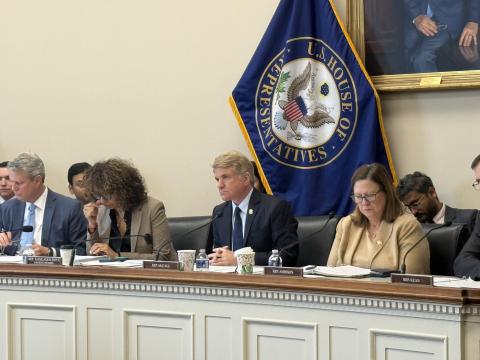McCaul Remarks at Hearing on Semiconductor Export Controls
WASHINGTON – Today, U.S. House Foreign Affairs Committee Chairman Emeritus Michael McCaul (R-Texas) questioned witnesses at a subcommittee hearing titled, "Export Control Loopholes: Chipmaking Tools and their Subcomponents." McCaul, a congressional leader on semiconductor and high-tech issues, has long championed export controls on sensitive U.S. technology that could be used to bolster China's military apparatus.

Excerpts from McCaul's exchange with Chris McGuire, senior fellow for China and emerging technologies at the Council on Foreign Relations:
McCaul: This is an issue I think is so important. I worked on this when I was a young federal prosecutor at the Department of Justice in 1996. [I] prosecuted the campaign finance violations from China, Johnny Chung, [which] led us to the director of Chinese intelligence [and] China Aerospace, putting money into his Hong Kong bank account to influence the presidential election.
And why? Because they wanted dual use satellite technology. They wanted to be a member of the WTO. They wanted China Aerospace to be the beneficiary of our technologies.
And since that time, they have come very, very long way. I introduced the Chips for America Act at the behest of Secretary Pompeo and Secretary Wilbur Ross in the first Trump administration to pull the manufacturing out of Taiwan, where 90% of the advanced production is made into the United States, so we can truly make America first in manufacturing of semiconductor chips. They got politicized unfortunately, but it’s working.
You know, DeepSeek is disturbing to me because we sold [the technology] to them. Nvidia … and it was legal, in their defense, at the time, sold the advanced chips that allowed China to make the first AI DeepSeek technology. [This] is now banned and would be illegal under current law.
But the damage is done. Now [China is] creating all these AI chips. In fact, in Open AI [models], I was told yesterday that China is actually ahead of the United States. So, in this great power competition, we have a lot of work to do. …
[China] can get around [export controls] real easy. On the entities list, you know you had Shanghai Biren. ... Advanced AI chips [were] banned from [being sold to them]. Then they changed their name to Shanghai Biren Semiconductor Technology, and they get around [the export controls].
So, I’m working on legislation that would basically set a statutory standard that would ban any affiliate that is 50% or more owned by a blocked entity. Do you believe that would be helpful? And that would be at BIS in the Commerce Department, over which we have jurisdiction.
…
McGuire: Yeah, I completely agree. I think we need to do both. I mean certainly on the most advanced Chinese fabs, we certainly should make sure that they are blocked from all US allies’ tools and completely blacklisted. The fact that allies can backfill is problematic. But I think you’re completely right that the only controls that we know will work and given the importance of this, it is really important that we apply controls that we know work — and thank you for your leadership in this issue over the years — I think it mandates that we have expanded country-wide controls to make that we get everything that is actually going to help Chinese production. And the best way to do that from a definition’s perspective as the China Committee, I think, highlighted in their report, is just to do all 300-millimeter tools, all tools capable of 300-millimeter wafers, which would … There’s no way that you could make any advanced chips with any 200-millimeter wafer.
McCaul: That’s a great point. You know my view is [China steals] it at a very large scale, and we get that in our classified briefings, but we don’t have to sell it to them. I’m worried on the advanced chip level, the horse is out of the barn. The damage is done. They are building a very high-level [capacity of legacy] chips to counter our advanced [chips].
But I think to the chairman’s point, we’re now getting into the manufacturing process. I see no reason, first of all, that we should be selling AI military-grade technology chips to China. And then number two, [sell] any manufacturing tools that could be used to make AI military-grade technology. Just a quick response.
McGuire: Completely agree. I think we should really block the Chinese comprehensively from being able to buy, make, or rent access to U.S. AI chips, and Congress should definitely help across the board on all three of those.
###